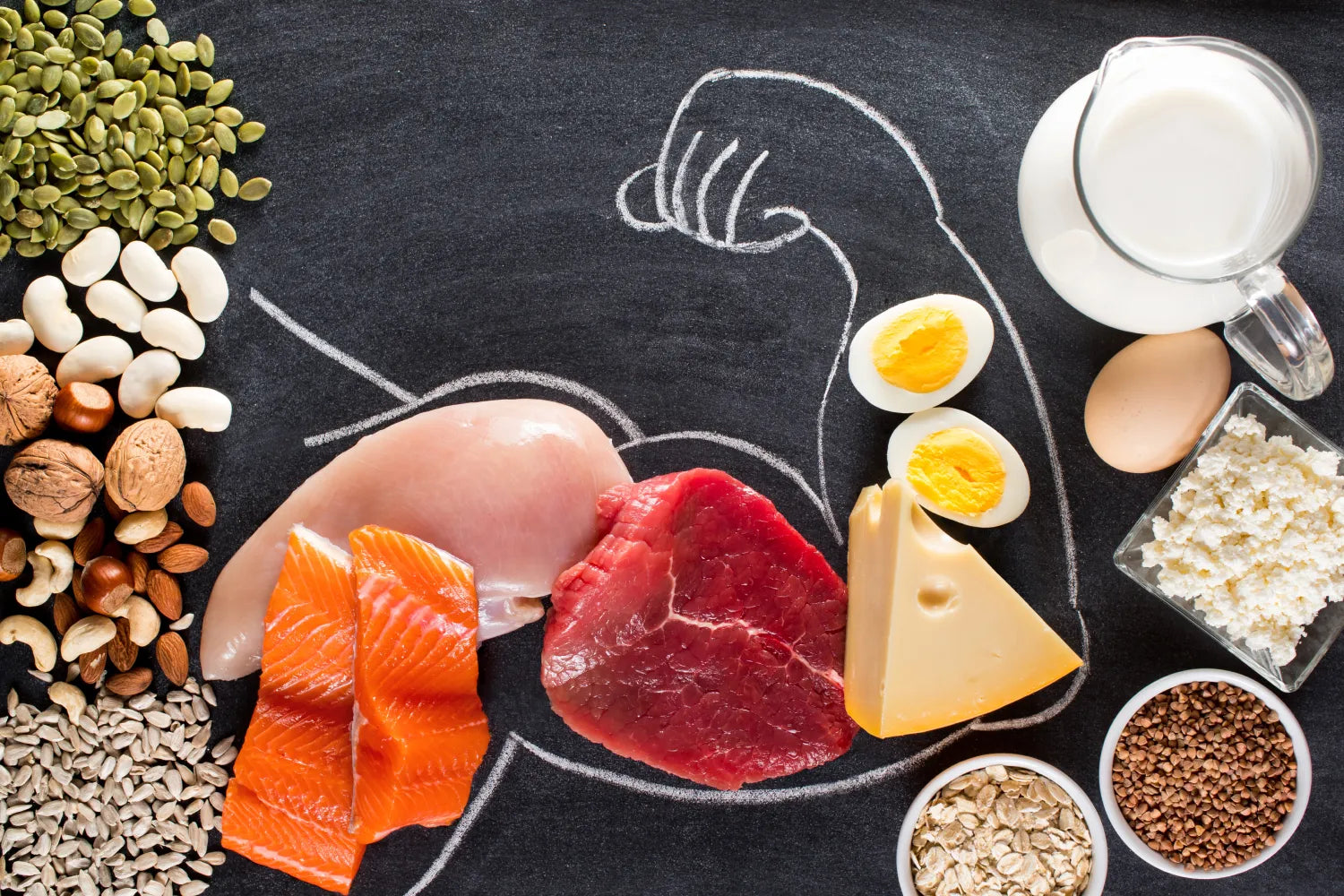
A well-executed workout can leave you feeling invigorated, strong, and accomplished. But that's only half the battle. The real magic happens during the recovery phase.
This is when your body gets to work repairing muscle tissue, replenishing energy stores, and strengthening your body for your next workout. It's a crucial part of any fitness regimen and one that's often overlooked.
The food you eat plays a pivotal role in this process. It’s not just about filling your stomach but fueling your recovery. But what are the best foods to help you recover effectively post-workout?
How Can Nutrition Affect Post-Exercise Muscle Recovery?
The food you eat after a workout can have a significant impact on your muscle recovery and your overall wellness. It's not just about eating a lot but eating the rightfoods. But why is that?
When you exercise, your body uses up its glycogen stores for fuel, which leads to your muscles being partially depleted of glycogen. Some of the proteins in your muscles also get broken down and damaged as you push your body to achieve your fitness goals.
Post-workout nutrition aims to replenish these glycogen stores, decrease muscle protein breakdown, and increase muscle protein synthesis — essentially, repair and grow your muscles.
What Nutrients Does Your Body Need for Muscle Recovery?
After a killer workout, your muscles crave specific nutrients to help them recharge. Carbohydrates are crucial for restoring glycogen stores.
Consuming the right kind of carbs — ones that are rich in fiber, are minimally processed, and provide a steady release of energy rather than a quick sugar spike — after a workout can help you recover faster and prepare for your next workout. Foods like whole grains and sweet potatoes are excellent sources of high-quality carbohydrates.
Another vital nutrient is amino acids. These are the building blocks of protein and are essential to build muscle and support muscle repair.
Consuming a high-quality protein source after a workout can provide your body with these necessary amino acids. This can help facilitate muscle protein synthesis, leading to stronger and more resilient muscles.
Antioxidants, found in a variety of fruits and vegetables, can also help manage the oxidative stress that occurs in your body after an intense workout. This can reduce muscle damage and inflammation, helping to speed up recovery time.
Ultimately, the food you eat post-workout can either support or hinder your muscle recovery. Making smart nutritional choices can help you feel better, recover faster, and perform stronger in your next workout.
Remember, taking care of your body is not just about what you do in the gym; it's also about the steps you take to rest and recover after.
What Are the Best Foods To Support Muscle Recovery?
Consuming the right balance of carbohydrates and proteins after a workout can significantly enhance your recovery and prepare your body for its next challenge, but what are the best foods to get these nutrients from?
Let’s break it down.
1. Whole Grains
Whole grains like brown rice and oatmeal are great for replenishing your body's glycogen stores post-workout. These complex carbohydrates provide a steady release of energy, aiding muscle recovery. Try a bowl of oatmeal topped with fruits for breakfast or a side of brown rice with your dinner.
2. Sweet Potatoes
Sweet potatoes are packed with high-quality carbohydrates and essential nutrients like potassium and vitamin C. These nutrients help in restoring glycogen stores and supporting muscle function. Incorporate them into your meals as a baked side dish or a salad topping.
3. Whey Protein
Whey protein is a quickly absorbed, high-quality protein rich in essential amino acids. It helps repair muscle tissue, promote muscle growth, and reduce muscle soreness. Try adding whey protein powder to your post-workout shakes or smoothies.
4. Cottage Cheese
Cottage cheese is high in casein protein, which is slowly digested, providing a steady supply of amino acids over time. This helps in muscle repair and growth. Enjoy it as a snack with some fruits or as a salad topping.
5. Greek Yogurt
Greek yogurt is not just a high-protein snack but also contains calcium and probiotics for added health benefits. It aids in muscle repair and contributes to overall wellness.
With about 15-20 grams of protein per serving, it's a great choice for post-workout nutrition. Have it as a post-workout snack with some granola and berries.
6. Bananas
Bananas are rich in potassium, an essential electrolyte that helps with muscle contraction and relaxation. Consuming a banana post-workout can aid in preventing muscle cramps and restoring energy.
7. Spinach
Spinach is a leafy green vegetable rich in magnesium and calcium, essential for muscle function. By supporting the repair of your muscles, these minerals can help ease discomfort associated with delayed onset muscle soreness. Add it to your salads, smoothies, or sandwiches to enhance your post-workout recovery.
8. Watermelon
Watermelon is rich in vitamin C, which aids in the production of collagen, a protein that helps repair skin tissue and blood vessels. Enjoy it as a post-workout snack to support your recovery process.
9. Salmon
Salmon is rich in omega-3 fatty acids, which have anti-inflammatory properties that can reduce inflammation, supporting faster muscle recovery. Incorporate grilled or baked salmon into your post-workout meals.
10. Chia Seeds
Chia seeds are rich in protein, fiber, and healthy fats. They provide a great balance of essential nutrients for muscle recovery and are considered one of the best muscle recovery foods. Add them to your smoothies, yogurt, or salads.
11. Peanut Butter
Peanut butter is a good source of protein and healthy fats. It provides sustained energy and aids in muscle recovery. Enjoy it on toast, or add it to your protein shakes.
12. Quinoa
Quinoa is a complete protein and a great source of fiber. It aids in muscle repair and keeps you feeling full. It's also a nutritious choice that can help maintain your body weight. Try it as a base for your salads or as a side dish.
13. Tart Cherry Juice
Tart cherry juice is rich in antioxidants, which can reduce muscle damage and inflammation, supporting faster recovery. Enjoy a glass post-workout to aid exercise recovery.
14. Avocado
Avocados are rich in monounsaturated fats, which are heart-healthy fatty acids. Packed with fiber and containing potassium and magnesium — which are crucial for muscle contraction and relaxation — this veggie is great for post-workout recovery.
Enjoy a creamy avocado in your post-workout salad, spread it on whole grain toast, or blend it into a smoothie for a nourishing treat.
How Else Can You Support Muscle Recovery?
While nutrition plays a significant role in muscle recovery, it's just one piece of the puzzle. There are other critical steps you can take to support your body's recovery process.
Hydration is another vital aspect of muscle recovery. Water helps transport nutrients to your cells and remove waste products, facilitating muscle repair and growth. Rehydrating after a strenuous workout helps replace the fluids lost through sweat and supports overall recovery.
And never underestimate the power of a good cool down and stretching session after your workout. This helps gradually reduce your heart rate, prevent muscle stiffness, and improve flexibility, all of which support muscle recovery.
Rest days are equally important. They allow your muscles time to repair and grow, reducing the risk of overuse injuries. Getting enough sleep is also crucial, as it's during deep sleep that your body produces most of its growth hormones, which are essential for muscle repair and recovery.
Incorporating compression gear into your routine can also have an impact on your well-being. Our Copper Fit compression sleeves are designed with recovery in mind, working to help support healthy blood flow to the muscles, which is essential for delivering nutrients to the muscles and removing waste products.
The Bottom Line
Muscle recovery is a crucial part of any fitness journey, and the right nutrition can make a significant difference. By incorporating the right balance of carbohydrates, proteins, and essential vitamins and minerals into your post-workout routine, you can support your body's recovery process, reduce discomfort, and prepare for your next workout.
But remember, nutrition is just one aspect of recovery. Hydration, rest, and the right gear are also key. We invite you to explore Copper Fit technology and incorporate it into your wellness journey. Together, with the right nutrition and recovery strategies, you can reach your fitness goals and enjoy the journey.
Sources:
Carb-conscious: the role of carbohydrate intake in recovery from exercise | PMC
Amino Acid: Benefits & Food Sources | Cleveland Clinic
Casein Uses and Benefits | Cleveland Clinic
Omega-3 Polyunsaturated Fatty Acids: Benefits and Endpoints in Sport | PMC





